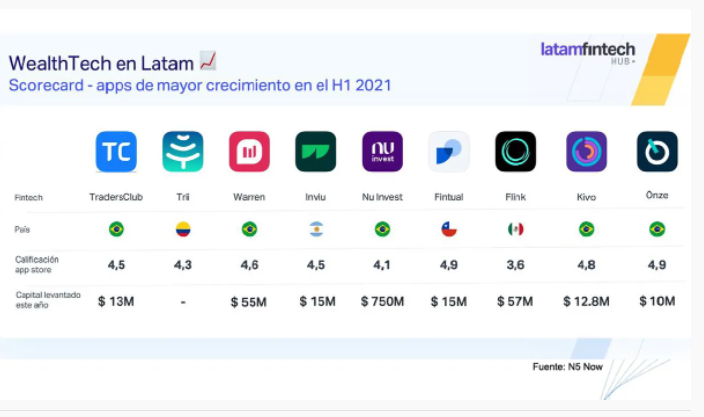It is a subcategory of fintech that seeks to democratize investment-related services. Why is it booming and what are its growth and billing prospects.
by Carlos Toppazzini | May 5, 2022 – 11:42

In these times, the financial sector, with fintech companies at the forefront, faces the great challenge of increasing the level of financial education, especially in Latin America. In the region, on average, more than 60% of people do not save or do so informally; And half of those who can save some money can’t scrape together $100 a month.
Precisely in this scenario, the so-called wealthtech began to gain ground in the last decade. In fact, this phenomenon registered a growth of more than 400% in the region and, in the last year, the applications with the greatest increase reached a turnover of nearly US$930 million.
His merit? Become a real path to democratize banking thanks to the fact that they offer easy-to-use and low-cost digital tools that allow users to identify the best way to invest their savings and manage their wealth online.
“The pandemic accelerated the evolution of many industries and the financial industry was no exception,” says Julián Colombo, CEO of the fintech N5 Now.
According to the specialist, people began to demand access to services that previously only belonged to big capital.
For this reason, “wealthtech companies increased their development and managed to consolidate themselves, becoming essential tools for managing finances and investments,” says Colombo.
According to Insider Intelligence, in the third quarter of 2021, wealthtechs were the only subcategory among fintechs to reach a record 132 financial deals globally
For his part, Juan Pablo Roig, co-founder and CEO of wealthtech Banza, maintains that one of the main catalysts for the rise of fintechs that work on savings and investment verticals was when “the opening of client accounts or of investments in a stock company (with which investors could operate in the Capital Market and the Stock Exchange), which previously required a huge bureaucracy”.
Then, he comments, “companies began to incorporate technology and a process of democratization of investments began.” Indeed, he acknowledges, “technology played a key role as a catalyst for digital transformation processes.”.
Wealthtechs on the global stage
In the region, by the end of 2021 there were some 222 wealth techs, of which the 9 with the highest growth reached a turnover of some US$928 million.

In Argentina, meanwhile, there are currently 7 companies registered, although the highest concentration of this subcategory is observed in the United States and Asia where, in the latter case, they had an increase of 2,893% in financing, between the end of 2020 and the beginning. of 2021, with a total collection of 449 million dollars in the first quarter of last year.
On the other hand, among the multiple services offered by wealthtechs, two aimed at the final consumer stand out: online platforms or brokers, which are used to buy and sell shares or other financial assets, and Robo Advisors, which “are chatbots that advise , they offer options following logical rules and carry out a large number of transactions automatically and accessible”, explains Colombo..
At a professional level, there are services focused on the analysis of financial data, investment tools and different software for financial management and market insights.
The regionalization of the industry
Although this evolution in the financial industry brings with it endless benefits, such as cost reduction, increased profitability and new business models that are committed to financial inclusion, Colombo warns that investment regulation is very specific and different for each country. ..
“This scenario forces fintech companies to make a great localization effort when changing geography, eventually losing the competitive advantages they had in their place of origin,” he says.
Along these lines, another challenge they must face is the preference of customers to adopt a fintech that gives them money (credit) over one that takes care of their money (investment). In any crisis or increase in instability, there is a “flight to quality”, explains Colombo, where less recognized or solid companies “see their balances flee to safer banks, which can cause liquidity risks”
Wealthtech: prospects and challenges
The truth is that digital transformation will continue to challenge the industry and wealthtechs will be the protagonists of this revolution “since there is a large space in the market for fintechs that offer simple savings and investment products, as well as for those that add diverse products such as investment supermarkets, where it is possible to acquire funds from many different institutions, with transparent and comparable prices”, Colombo points out.
For his part, Juans Pablo Roig considers that the big question will be to see how companies will differentiate themselves and, for him, this should happen “based on the product offer and the user experience that is provided to the customer”.
Undoubtedly, he adds to conclude, “there is still a lot to grow because there are still too many people in the country and in the region who choose to leave their money under the mattress or in a fixed term and are reluctant to use technological platforms.”
For more information, please access our downloadable
Comentarios 00 comentarios en moderación

